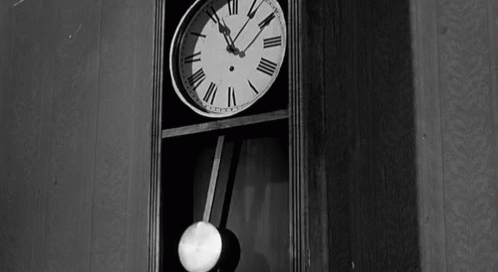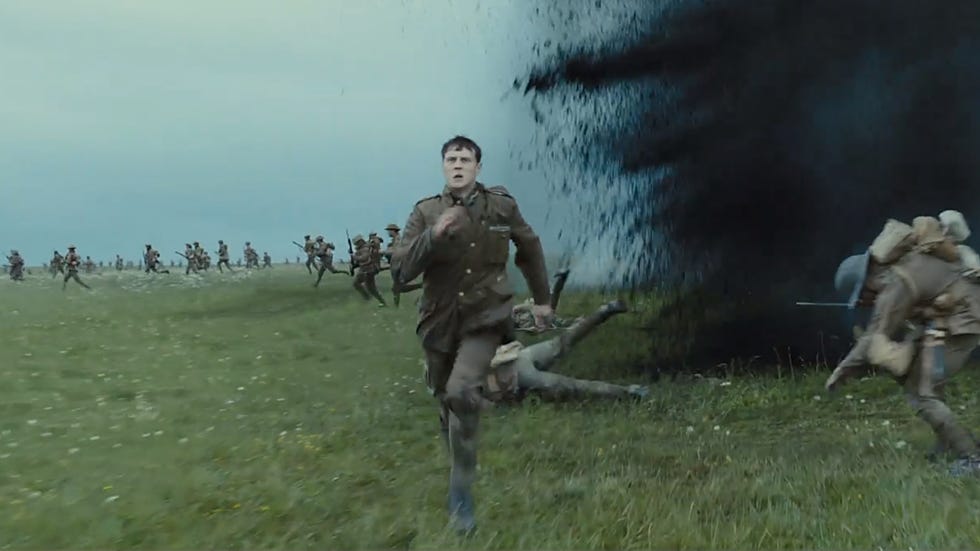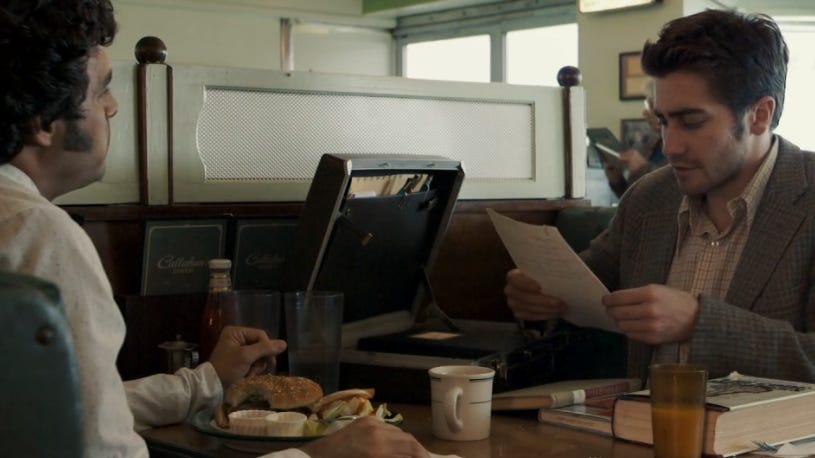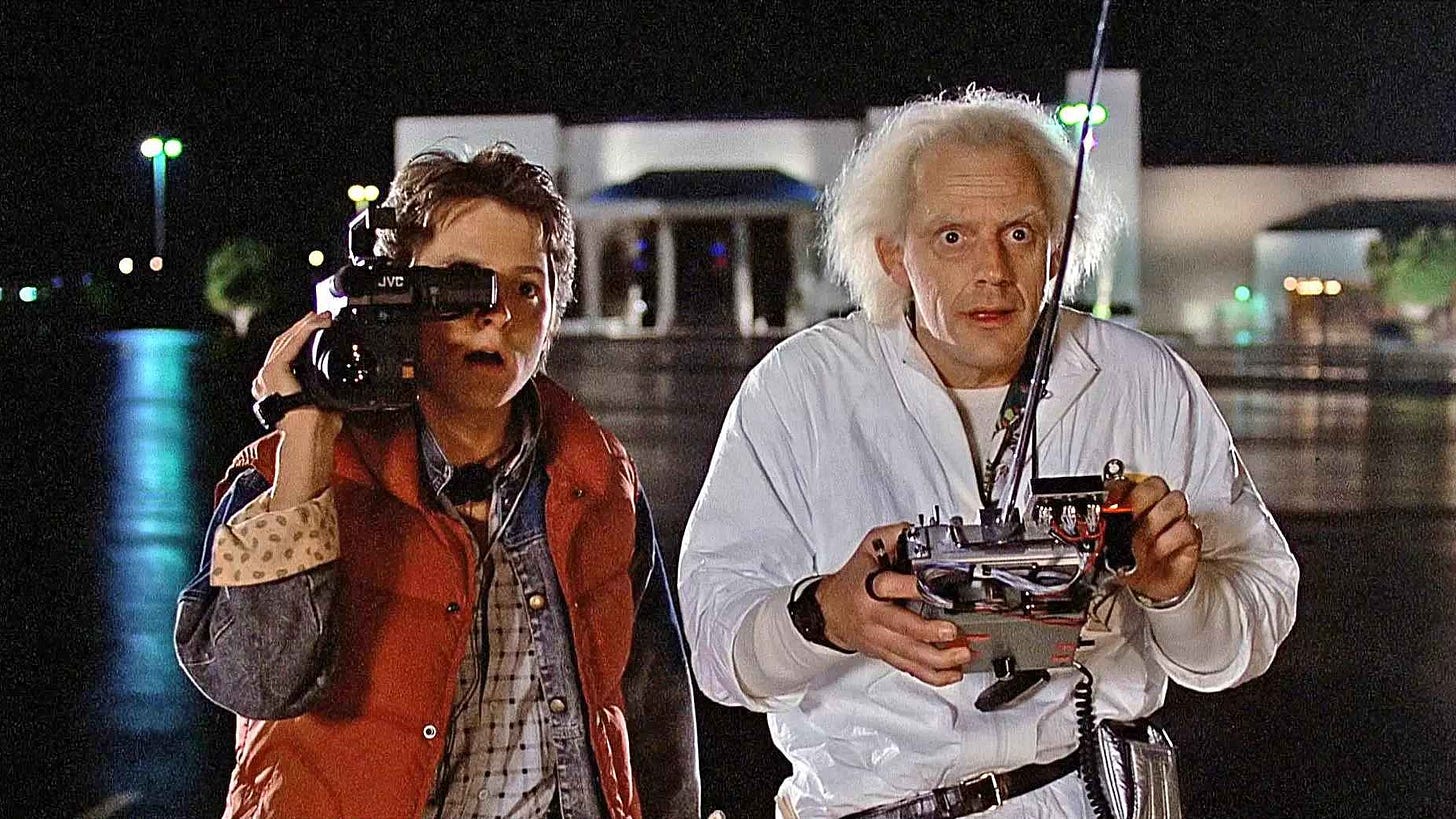We’ve gone backwards, to the future, to the end, and slowly. This time on Ponytail Picks, we tackle the clock head on. Great Scott!
LISTEN
Songs that use time to set you off balance
I admit it: I’m a music theory nerd. At the age my siblings opted out of piano lessons, I decided to stick around to fill in quarter notes. So when a song ventures away from the standard 4/4, 3/4, or 6/8 time signature, I notice with delight.
Here are a few my favourite examples of songs with rhythm structures that set you off balance. Listen track by track or find the playlist here.
The National, “Fake Empire”
The beauty of “Fake Empire” is that it never decides whether it has three beats per measure or four. From the introductory piano part, to Bryan Devendorf’s off-kilter 6/8 pattern, to the competing brass players bringing the track to a close, The National keeps your attention moving from start to finish.
Pink Floyd, “Money”
Funny that an album with a track called “Time” would play with it in a song called “Money,” but Pink Floyd made a career out of defying expectations. The 7/4 groove(?) comes and goes throughout, offering a heavy-pocket sway to the verses that keeps you from being too sure of your step.
Broken Social Scene, “7/4 Shoreline”
Now here’s a legitimate asymmetrical groove, no bracketed question-mark required. When an open-air show at Deer Lake Park introduced me to Toronto’s indie institution Broken Social Scene back in 2005, this was the song that sold me on the band. Show me a track with more music-festival energy. I dare you.
Sufjan Stevens, “Too Much”
I’m hesitant to share the time signature of this one because half the fun is trying to figure it out. Stevens takes a pattern and doubles the complexity by throwing emphasis where a pop music listener doesn’t expect it. The result leaves your downbeat-trained ear feeling jostled around like it’s lost in a crowded train station.
Blessed, “Centre”
Speaking of getting pushed around by a song, this one by Abbotsford post-punkers Blessed uses time signature switches throughout to crank the energy level up a notch.
If I can ask one thing of you, please let this song play out in its entirety. Even with the multiple time shifts, I assure you, you will never be ready for how “Centre” ends.
BADBADNOTGOOD, Colin Stetson “Confessions, Pt. II”
I haven’t looked at the score for this contemporary Canadian jazz collab fit for the ages, but I’m guessing it’s in 10/4? Not its Mission-Impossible cousin 5/4, but, because of drawn-out pattern, 10/4.
I know, I know: I could’ve chosen from a long list of jazz artists screwing around with time (“Take Five” anyone?). But I had to pick this track, simply because I smile and nod along every time think about it. Following along feels athletic.
-AK
WATCH
Tackling time at the movies
Time is a tricky thing to handle when you’re telling a story on the big screen. You only have two hours or so to make it happen; if your narrative has a time span that’s longer, how do you make your audience feel that weight? Conversely, if it is only a 2-hour narrative, how do you convince your audience that the story is actually happening in real time, when in real life (this is getting confusing), it was probably filmed over hours-long shoots for multiple weeks? And then of course there are those mind-bending films that base their entire narrative on the concept of time and experiment with how it can or could be manipulated, and there’s certainly no easy way to tell those stories on or off screen. But without further ado, here are a couple picks for each of these three categories:
Real time tales
Good Time (2017)
The sense of time here is frantic, anxiety-provoking, claustrophobic—anything but good, really. It’s a race, a fight against it, set in the gritty underworld of New York City, where time stops for no one, not even for sleep.
1917 (2019)
The title references a year; the movie is much more condensed. A harrowing journey through trenches and over battlefields, in no man’s land and in lands full of men. There are guns and bombs galore, but as its tagline says, “Time is the enemy.”
Years-long yarns
Dark Waters (2019) / Zodiac (2007)
Lumping these two together because they’re very much of the same vibe (and both star Mark Ruffalo). One is a legal battle against a corporation a la Erin Brockovich and one is a chilling hunt for a serial killer, but both poignantly capture how devastatingly heavy time can weigh when justice is pending.
The Place Beyond the Pines (2012)
One story turns into another and then into another. A person kills, another dies, others are born. Generational trauma, legacy-grappling, it’s all here, giving the classic cops and robbers narrative framework astonishing dramatic depth.
Time twisters
Back to the Future (1985)
The quintessential time-travel movie, capturing all the excitement, fun, humour, and life-altering suspense that you’d imagine there would be when you accidentally travel back in time and meddle in your own parents’ lives in the romanticized version of 1950s America.
Tenet (2020)
I probably would have rather mentioned one of Christopher Nolan’s other high-concept flicks Interstellar or Memento here, but I just recommended the former in the last edition of picks (“Space”), and it’s been too many years since I’ve seen the latter to be able to adequately talk about it, so I’ll stick with his last release, the highly ambitious Tenet, a mind-bending time-travel tale of espionage which honestly could’ve been told a lot better (couldn’t hear half the dialogue, never mind understand it), but remains extremely compelling. I didn’t quite get it, but maybe you could?
-JB
READ
Poems about time spent with God
Rilke’s Book of Hours
When you think about it, the idea of “spending time with God” seems odd. If God is omnipresent, do we really have a choice?
Rainer Maria Rilke spent a lot of time thinking about this, and rather than getting stuck in the pretzel I just described, he chose to embrace it. The results of that time became his Book of Hours.
No matter where you sit on the believer/atheist spectrum, Rilke’s way of looking at God will give you something to ponder. Here’s an example of what I mean1:
You, God, who live next door— If at times, through the long night, I trouble you with my urgent knocking— this is why: I hear you breathe so seldom. I know you're all alone in that room. If you should be thirsty, there's no one to get you a glass of water. I wait listening, always. Just give me a sign! I'm right here. As it happens, the wall between us is very thin. Why shouldn't a cry from one of us break it down? I would crumble easily, it would barely make a sound.
About his fellow believers, he has this to say:
We must not portray you in king's robes, you drifting mist that brought forth the morning. Once again from the old paintboxes we take the same gold for scepter and crown that has disguised you through the ages. Piously we produce our images of you till they stand around you like a thousand walls. And when our hearts would simply open, our fervent hands hide you.
So not your average Sunday sermon fodder.
If these two excerpts light your brain on fire like they do for me, consider this an “urgent knock” prompting you to find a copy of this book. I’ve read two translations—one by Anita Barrows and Joanna Macy, another by Susan Ranson—and both are excellent. It’s popular enough that you should be able to find it at your local library or bookstore in one form or another. I’d go with the former. You’re not going to want to return this one.
-AK
The clock has struck midnight and we’ve got to run off. Hopefully we don’t leave any shoes behind because we’ll need them to pedal our
bicycles
in two weeks time.
Courtesy of the translation by Anita Barrows and Joanna Macy.














Absolutely loved The Place Beyond the Pines, Joel. Good pick!
Love to see an Abby shoutout, Andrew! ;) Great pick. For all of their complex rhythms, Blessed are incredibly tight live. It's a wonder to watch.